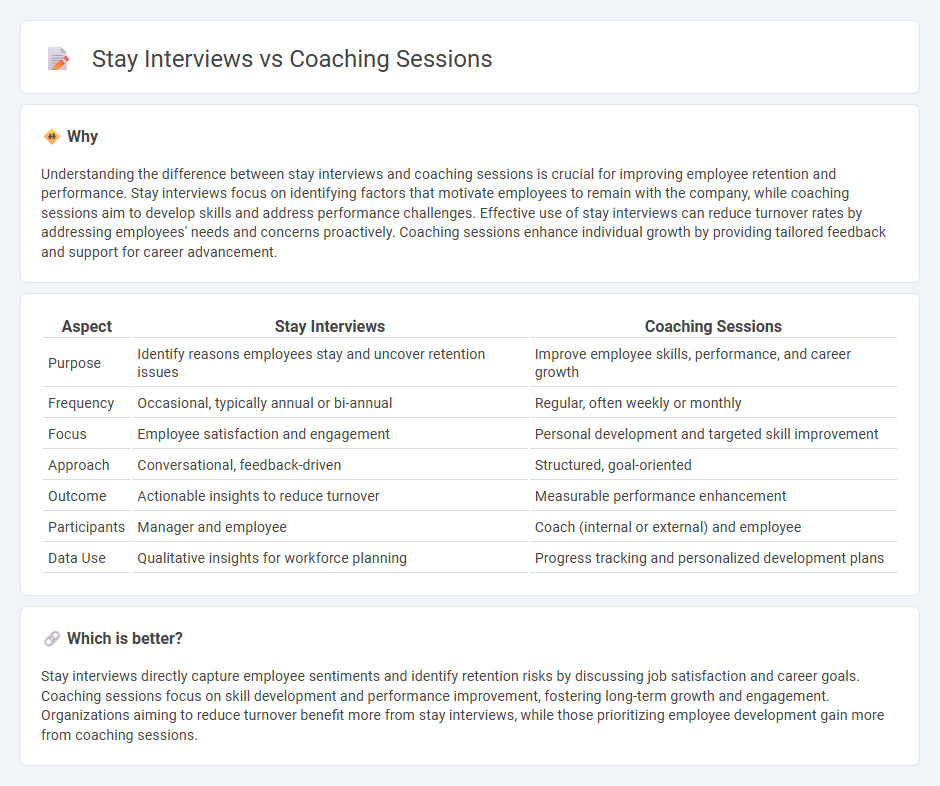
Stay interviews focus on understanding employee satisfaction and retention factors to reduce turnover rates, while coaching sessions aim to enhance individual performance and professional development through personalized guidance. Both strategies contribute to a more engaged and productive workforce by addressing distinct needs within employee management. Explore the benefits and applications of stay interviews versus coaching sessions to optimize your talent retention and growth initiatives.
Why it is important
Understanding the difference between stay interviews and coaching sessions is crucial for improving employee retention and performance. Stay interviews focus on identifying factors that motivate employees to remain with the company, while coaching sessions aim to develop skills and address performance challenges. Effective use of stay interviews can reduce turnover rates by addressing employees' needs and concerns proactively. Coaching sessions enhance individual growth by providing tailored feedback and support for career advancement.
Comparison Table
| Aspect | Stay Interviews | Coaching Sessions |
|---|---|---|
| Purpose | Identify reasons employees stay and uncover retention issues | Improve employee skills, performance, and career growth |
| Frequency | Occasional, typically annual or bi-annual | Regular, often weekly or monthly |
| Focus | Employee satisfaction and engagement | Personal development and targeted skill improvement |
| Approach | Conversational, feedback-driven | Structured, goal-oriented |
| Outcome | Actionable insights to reduce turnover | Measurable performance enhancement |
| Participants | Manager and employee | Coach (internal or external) and employee |
| Data Use | Qualitative insights for workforce planning | Progress tracking and personalized development plans |
Which is better?
Stay interviews directly capture employee sentiments and identify retention risks by discussing job satisfaction and career goals. Coaching sessions focus on skill development and performance improvement, fostering long-term growth and engagement. Organizations aiming to reduce turnover benefit more from stay interviews, while those prioritizing employee development gain more from coaching sessions.
Connection
Stay interviews provide valuable insights into employee motivations and concerns that directly inform personalized coaching sessions aimed at enhancing job satisfaction and performance. Coaching sessions use data gathered from stay interviews to tailor support strategies, fostering employee engagement and reducing turnover rates. This connection creates a continuous feedback loop that aligns individual development with organizational goals for improved retention.
Key Terms
Performance Improvement (Coaching Sessions)
Coaching sessions emphasize individualized performance improvement through targeted feedback, skill development, and goal setting, fostering continuous growth and accountability in employees. Stay interviews focus on understanding employee satisfaction and retention drivers, addressing concerns before they lead to turnover. Explore how integrating coaching sessions can elevate your team's performance and engagement.
Employee Retention (Stay Interviews)
Coaching sessions enhance employee performance and development by providing personalized guidance, while stay interviews specifically target employee retention by identifying factors that motivate staff to remain with the company. Stay interviews gather valuable insights into job satisfaction, workplace culture, and potential retention risks, enabling proactive strategies to reduce turnover. Explore how integrating stay interviews into retention plans can strengthen your workforce stability.
Feedback Mechanism
Coaching sessions emphasize personalized feedback mechanisms aimed at continuous skill development and performance improvement. Stay interviews prioritize feedback to uncover employee concerns and motivate retention through open dialogue. Explore how leveraging both strategies can optimize organizational growth and employee satisfaction.
Source and External Links
How to Plan a Productive Coaching Session - This article provides templates and strategies for structuring effective coaching sessions, including warm-ups, goal setting, and action planning.
Coaching Session 101 - This guide offers a structured approach to coaching sessions, covering goal identification, reviewing action items, and exploring areas for improvement.
First Coaching Session - This resource focuses on setting the tone for a coaching relationship, establishing trust, and clarifying expectations in the first session.
 dowidth.com
dowidth.com